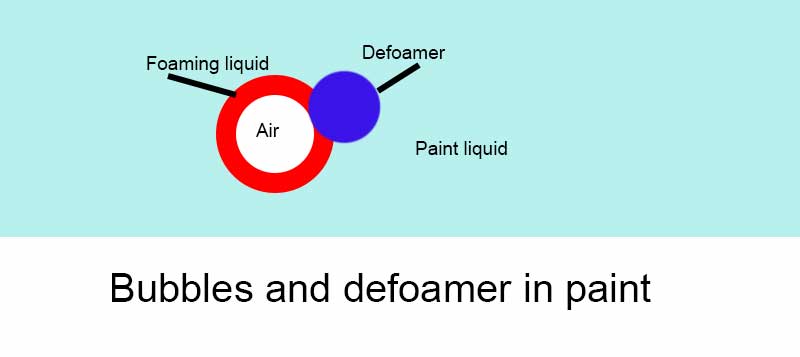The Role of Defoamers in Enhancing Product High Quality and Efficiency
In different manufacturing procedures, the presence of foam can significantly hinder product quality and functional performance. Defoamers function as crucial additives that minimize this problem, making certain smoother manufacturing process while improving the useful and visual characteristics of the last items (defoamers). Their application covers a wide variety of industries, from food and drink to drugs, where consistency and reliability are critical. The choice of the ideal defoamer can be vital to attaining optimum outcomes, raising vital questions concerning solution compatibility and efficiency metrics that merit further exploration.
Comprehending Defoamers
Comprehending the duty of defoamers is crucial for maintaining item high quality throughout different markets. Defoamers are chemical ingredients created to avoid the formation and minimize of foam in fluid systems, which can negatively influence processes such as blending, filling, and surface area stress. Foaming can result in inadequacies, item issues, and endangered aesthetic appeal, making defoamers a vital part in producing procedures.
In industrial applications, defoamers help to boost item consistency and security. In the paint and layers sector, foam can conflict with the application process and the final finish. In a similar way, in food and drink production, extreme foam can hinder bottling and packaging performance (defoamers). The efficient use of defoamers not just guarantees smoother production procedures however likewise adds to exceptional product performance.
Additionally, the selection and solution of a defoamer should line up with specific application requirements, such as compatibility with other components, efficiency under varying temperature and pH problems, and prospective governing constraints. Eventually, recognizing defoamers' features and their value in numerous formulations is crucial for enhancing production and ensuring the finest quality final result.
Kinds Of Defoamers
Defoamers can be categorized into a number of types based on their composition and device of activity. The main types consist of silicone-based, non-silicone organic, and not natural defoamers.
Silicone-based defoamers are among the most effective, primarily because of their capability to spread out quickly on the fluid surface and disrupt foam formation. Their one-of-a-kind chemical framework allows for remarkable stability, making them ideal for high-temperature applications and atmospheres with varying pH levels.
Non-silicone organic defoamers, commonly made up of fatty acids or natural oils, are valued for their biodegradability and reduced poisoning. These are commonly used in food and drink applications where safety and environmental influence are vital.
Not natural defoamers, which consist of compounds like talc or calcium carbonate, act by increasing the density of the liquid, therefore lowering foam security. They are commonly used in commercial procedures where compatibility with other materials is not an issue.
Each kind of defoamer has distinctive advantages and constraints, allowing for tailored remedies depending on the details foaming concerns experienced in different applications. Recognizing these distinctions is essential for maximizing efficiency and accomplishing preferred product top quality.
Applications Across Industries
Many industries utilize defoamers to improve item high quality and functional performance. In the food and beverage sector, defoamers are important in procedures such as developing and milk production to avoid foam formation, which can result in inefficiencies and item incongruity. By regulating foam, producers can make certain far better return and an extra uniform product.
In the pharmaceutical sector, defoamers play an essential role in the solution of liquid drugs, where excessive foam can hinder blending and precise dosing. Their usage assists keep the stability of the formulations and assists in smoother manufacturing processes.
The paint and coverings market also counts on defoamers to enhance the efficiency of items throughout application. By minimizing foam, these ingredients make certain a smoother coating and enhance the aesthetic high qualities of the final product.

Benefits of Utilizing Defoamers
While the application of defoamers differs across industries, their benefits consistently enhance product top quality and process efficiency. One substantial benefit is the reduction of foam development throughout producing processes, which can otherwise cause manufacturing hold-ups and variances in product top quality. By reducing foam, defoamers allow a smoother circulation of products, helping with much more effective operations and lowering the chance of tools breakdowns.
Additionally, using defoamers can improve the appearance and texture of last products. In industries such as finishes, paints, and food processing, too much foam can compromise the visual aesthetics and general quality, while the suitable defoamer application guarantees a consistent finish and desirable features. Moreover, defoamers can add to cost financial savings by lowering waste throughout production and optimizing making use of raw materials (defoamers).

Choosing the Right Defoamer
Choosing the best defoamer is essential for maximizing production procedures and making sure item quality. The option of defoamer affects not only the effectiveness of foam control however additionally the overall performance features of the end product. Elements to take into consideration include the kind of application, the chemistry of the formulation, and the ecological problems under which the item will be made use of.
Various industries might call for details defoamer types, such as silicone-based, natural, or polymeric defoamers. Recognizing the compatibility of the defoamer with the key components is necessary to stay clear of negative reactions that might compromise item stability. Furthermore, the check my blog defoamer's effectiveness in different temperatures basics and pH levels need to be assessed to ensure consistent efficiency.
Checking the defoamer in small applications can give valuable understandings right into its efficiency and viability. Consideration of regulatory compliance, particularly in food, drugs, and cosmetics, is paramount in selecting a defoamer. Ultimately, a thorough assessment of these variables will lead to the selection of a defoamer that not only controls foam properly but likewise enhances the top quality and efficiency of the end product.
Verdict

Finally, defoamers are vital ingredients that dramatically improve product quality and efficiency across numerous markets. By effectively reducing foam formation, these agents not just improve functional effectiveness however likewise add to the useful and aesthetic integrity of products. The strategic selection and application of defoamers result in cost financial savings, enhanced source usage, and boosted customer contentment. On the whole, the significance of defoamers in industrial procedures can not be overemphasized, as they play a vital function in accomplishing consistent and high-quality outcomes.
Lathering can lead to ineffectiveness, product flaws, and endangered aesthetic charm, making defoamers an essential part in manufacturing procedures.
